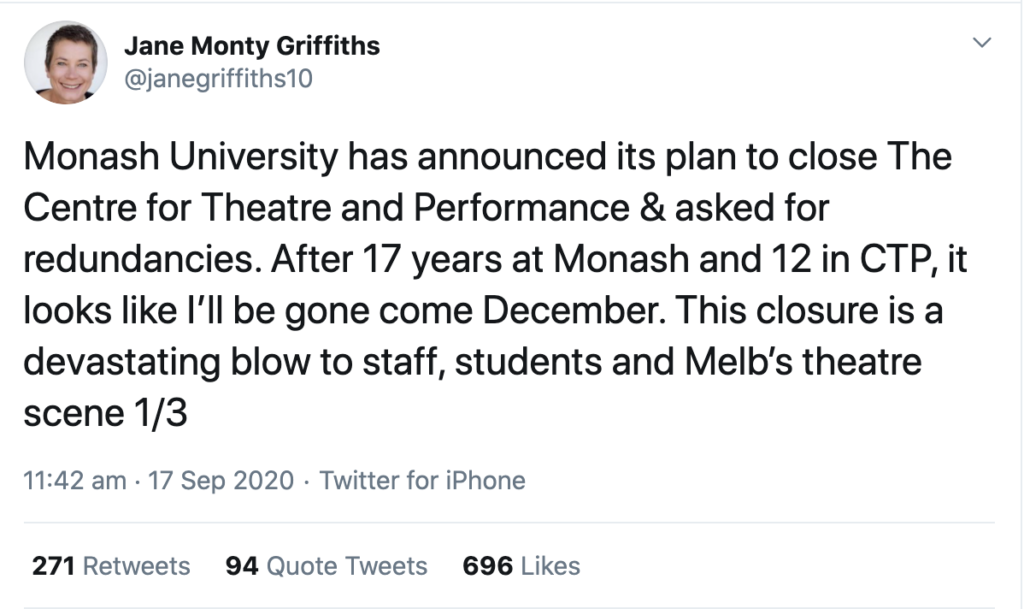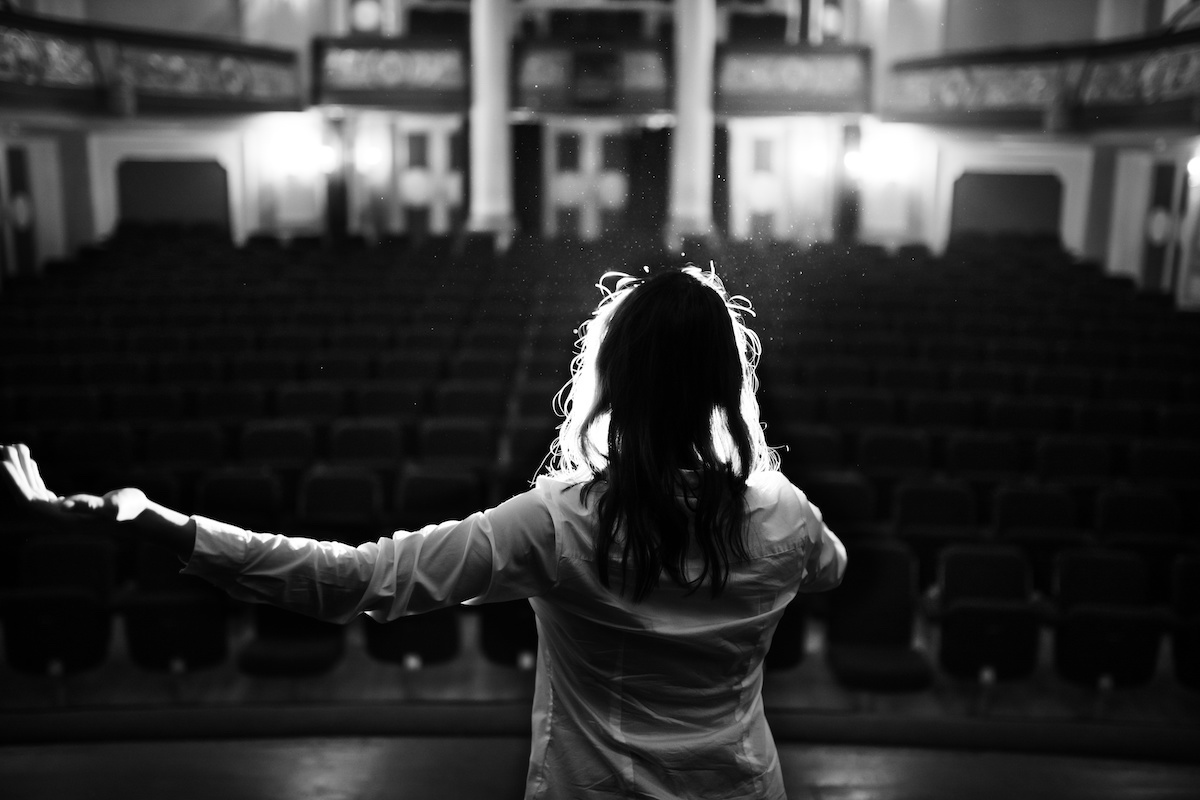The proposed closure of Monash University’s CTP is a devastating blow to Australian theatre culture, says Robert Reid
As I sat waiting for my next zoom class to start, the news emerged via Twitter – from Professor of Theatre and Performance Jane Montgomery Griffiths – that the Centre for Theatre and Performance (CTP) and reportedly the theatre studies degree, will be axed by Monash University at the end of this year.
The phrase “reckless act of cultural vandalism” is thrown around so often in this country that it feels as if it’s lost all meaning. But the axing of the thriving CTP – with its exemplary mix of academic study and practical education, its partnerships with theatre companies such as the Malthouse and organisations like the Melbourne Fringe, and its strong, ongoing relationships with a wide range of independent artists – seems to lift this vandalism to another level.

One might reasonably ask, is this closure really such a problem? Do we genuinely need so many courses teaching what is essentially a vocational degree? Are these courses just churning out more graduates who will have to retrain after a few years of auditioning, serving coffee or answering phones to make a living? Are they just producing job-ready graduates for jobs that simply aren’t there?
But these questions fundamentally misrepresent the function of theatre in the community outside the main stages. This reductive mindset denies future writers, directors, actors and designers the agency to make their own work with their own companies and to develop their own audiences.
It has been demonstrably shown – I know because I’m the one who showed it, in my PhD thesis “After The Pram” – that the link between university and student theatre and the wider theatre industry is vital. Ground-breaking Victorian companies like W.E.S.T, TheatreWorks, Whistling in the Theatre, Chameleon, Theatre@Risk, The Black Lung and The Hayloft Project and more all grew out of tertiary theatre training.
Without theatre at universities, there’d be no Barrie Kosky. Without theatre at universities, there’d be no Melbourne Theatre Company. In one form or another, through theatre courses and student theatre companies, theatre at university has been the bones and flesh of our industry.
‘It is the winnowing of who we are. The abandonment of who we might be.’
I taught as a sessional at Monash for five years or so, and was a guest lecturer for another five. Like many Melbourne theatre makers, I’ve worked closely with students from the CTP. Just last year, I worked with a crew of amazing Monash actors sourced from the campus by Monash University Student Theatre (MUST), many of whom were CTP students, to stage my production of The Bacchae at The Carlton Courthouse.
Without this incredible, enthusiastic and talented bunch, that project – which required a cast and crew of over 40 women and non binary performers – would never have happened. No professional or indie theatre company has those kind of resources, or that bravery. And this doesn’t include the many ex-CTP students who worked with me on the development of the text over the years.
I’m not teaching at Monash at the moment. Instead, I’m working as a sessional at Deakin for as long as they’ll have me. It’s no secret that there are widespread restructurings happening at Deakin as well, both Covid-related and not, so I’m waiting for Damocles’s sword to fall over the next few months.
With a PhD in Australian theatre history and 20 years’ experience as a writer, director and dramaturg, you might think that it would be easy for me to find work teaching theatre history in Australia. This hasn’t been the case. Few drama institutions can find space in their curricula to teach our theatre history, and those that do are forced to find ways of sneaking it into the diet of the students in piecemeal ways.
Despite this, I have worked at many of the tertiary institutions that teach (or taught) theatre and drama in this state over the past decade, and in that time and I’ve seen a creeping sickness spreading throughout the sector.
For the past two hundred years or so, Australia has rarely been a culture that has relished engaging with its history. There are so many hard things to deal with, so many crimes to be accounted for, so many failures to own. But our reticence to teach the history of Australian performance has always been more damaging than merely an encouragement of our wilful ignorance.
Without knowing about the theatre makers and story tellers that have gone before us, how can new generations of artists see any kind of path towards making theatre and telling our stories? How can they value it? When our erased past is nothing but absences, the future must look inevitably international.
This has always seemed deliberate to me.
‘So many of the problems that face Australian theatre reflect the fundamental belief that theatre is only for a handful of Australians’
I have told myself that at least there are still places where the future theatre makers of Australian can learn the skills to make work, even if they are always asked to begin telling our stories from scratch, without a tradition to build from. With tertiary courses that teach critical thinking and performance theory, voice and acting techniques, or even a basic introduction to contemporary international theatre-making practices, there’s been a little hope, although the predilection in too many of our faculties to focus exclusively on Shakespeare, Chekhov and Beckett reflects a Eurocentrism that speaks to the elitism in how Australian bureaucracy thinks about the arts.
So many of the problems that face Australian theatre reflect the fundamental belief that theatre is only for a handful of Australians. They reflect the idea that culture can only be understood by those who can afford it, and that, for everyone else, there’s Netflix.
Monash’s CTP is the first to fall, and I can’t help but wonder which domino will be next. Some of the places I have worked are already running on skeleton staffing. Many are already squeezed far beyond their ability to function efficiently and effectively. Most are struggling to simply keep their heads above water.
It’s insanity to keep cutting at our own theatre culture until there’s nothing left but American and English re-runs. But, of course, shutting down university drama courses is a very good way of shutting up dissenting and diverse Australian voices.
Right now, my Facebook feed is filled with the shocked, outraged and heartbroken posts of my former Monash students and friends. Once again, the machine that is university administration moves summarily and without consultation to the shoot the country in the foot and the arts in the heart.
It is the winnowing of who we are. The abandonment of who we might be.
I wish I could say I was surprised. Instead I can only wonder, who’s next?


5 comments
Well put, Robert. For at least the past 50 years, Creative Arts teaching and learning in the Australian higher education system has had a cultural and social impact far beyond the question of whether or not graduates are immediately ‘job ready’. Monash’s decision to clearfell its theatre, musicology and ethnomusicology programs is the clearest sign yet of how cowed its administrators have become after decades of being ‘trained’ into neoliberal models that privilege Benthamite economic modelling over long term cultural vision. Universities now face their worst budget crisis in decades, exacerbated by the current global pandemic but founded in government funding formulas that have first squeezed institutions into an overdependence on overseas student income, then arbitrarily changed the price signals for domestic enrolments. But these actions to cut programs show a heartbreaking ignorance on the part of university bean counters of what these programs mean for the health of our cultural ecology and our national capacity for creative thinking. This is vandalism – and we must be ready to call it out.
Hi Rob, this is well said and remains the long standing and on-going issue with arts and culture in this country. Anyone who says the cultural cringe is dead in Australia is in denial. We continue to underestimate, undervalue and just simply denigrate our cultural voice and product. It’s a ridiculous and immature stance and it’s time as artists and teachers we stop tolerating it. And don’t expect universities which have become cash dependent to fight any such ideological battles.
To put it plainly, the value to both performer and audience member of a live production, be it music or theatre, circus or dance, is incalculable. It’s a given that such performances can be so many things – entertainment, education, consciousness-raising, catharsis, but more than this they are powerful as mood-enhancers , giving appreciable mental well-being to performer and receiver alike. No other means of publication conveys the same degree of interaction – even when the audience is largely passuve – as seeing a live orchestra, or singers, company of actors or acrobats. The experience enlarges the mind and raised the spirits. This is physiologically very good for us.
I suggest that however generous companies and ensembles have been to audiences in these present times – and they have showered us with offerings – Zoom and YouTube just don’t do it for us half so well. I’d give every one of those online performances to stand with my choir and belt out Verdi’s”Tuba Mirum” as I should have been doing only a week ago, knowing we were transporting the audience as well as ourselves.
University theatre departments teach students about collaboration. And that’s really important. They provide opportunities for theatre workers—productions, residencies, short- and long-term employment. And that’s also really important. They’re a vital part of our cultural and educational ecology. And my heart breaks every time I hear that we’re losing yet another university theatre department.
Absolutely terrific article, Robert; so succinctly and eloquently argued.
Comments are closed.